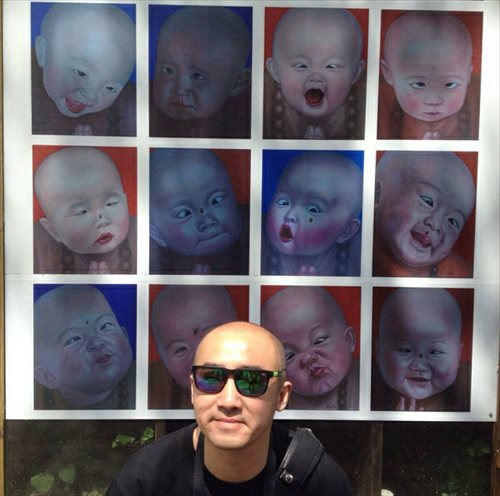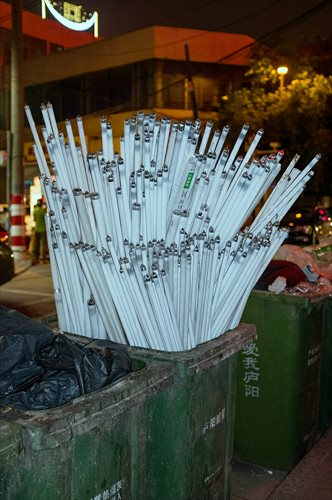HOME >> CHINA
Water meter reader-turned-photographer Liu Tao captures humor in the mundane
By Liang Chen Source:Global Times Published: 2014-10-31 5:03:02

Liu Tao Photo: Courtesy of Liu Tao


Liu Tao, a water meter reader in Hefei, Anhui Province, never imagined that the arc of his career would change so rapidly.
If it hadn't been for photography, he would have been a water meter reader his whole life. The job was mechanical and tedious: He had to walk up and down streets and alleys, knock on the doors of every neighborhood, open water meters and write down numbers.
"Life was constraining. I wanted to be free," 32-year-old Liu told the Global Times.
For the last three years, he took advantage of the nature of the job and started to take photos as he moved through streets and alleyways. He took photos of average people, but unlike many street photographers who mostly reflected the suffering of their lives, Liu's pictures always evoked a sense of joy and humor.
He began uploading his photos online through photography websites or Weibo. The response was usually tepid, until recently, after a famous photography magazine reposted his photos via its official Weibo account. The strength of the public response surprised him greatly. In the matter of just a few days, his photos on Weibo were reposted more than 50,000 times and received over 20,000 comments, most of which praised his work.
Last month, he was also invited to stage a photography exhibition in Beijing, where he also won a prize, upping his media profile even further.
Liu had no idea why he had suddenly become so popular.
"I started posting my photos on Weibo three years ago. I like taking photos because I can hang around on the streets and capture an image when something interested me but was neglected by others. I want to remind people of the touching moments in life," Liu told the Global Times.
Liu added, he had not been fully prepared for all the acclaim, but he stressed, photography gave him "a real existence on the earth" - something that everyone is searching for.
Life-changing experience
Liu said his life had been as full of worries as most people's until he found the camera, and the world it offered seemed grand and attractive.
A vein of black humor runs through his photos. In one, a stylish girl appears to be kissing the bottom of a casually dressed man as he bends down to pick up something. In other photos, parts of people's bodies are covered by various objects, creating the illusion that the object, which could be a dog's head or a potted plant, is part of the person's body.
People in his photos are often in striking contrast with their surroundings, creating a visual shock. In one photo, a middle-aged couple whose heads are reflected in a car mirror present a strong contrast to the posters of a revolutionary film.
"Precious human emotions, dramatic scenes and moments full of black humor seem to clash with my heart… that's where I found a long lost joy and happiness," Liu once wrote on his Weibo.
Liu said his photos were not commercially oriented. He is strongly against commercialization. "I want to express the idea that the over-commercialization has eroded people's living space and made them feel small. I want people to care more about others, instead of fame and fortune," Liu said.
Fans echoed this idea. "His photos are not only pleasing, but also offer a totally different perspective on the mundanities of life," Yan Jie, who has looked through every photo that Liu has posted on his Weibo, wrote in one of his critiques.
Some critics said that his photos are a tragicomic form in which laughter and despair are inextricably tangled.
A slow process
It also took a long time for Liu to gain a sense of self-worth.
After graduating from a local vocational school, he was recruited to work at the local water resources bureau. Straightaway, he was dispatched to work in the suburbs, checking on the quality and safety of the water.
In 2005, he was then transferred from the suburbs to the city, starting his job as a water meter reader.
The tedious, complicated job exhausted him. He remembered how desperate he became when it rained and he had to go outdoors to read water meters. "For a long time, I felt lost," Liu said.
He earned 50,000 yuan ($8,175) per year. By that time, his biggest wish was to transfer from his post as an outdoor worker and get an office job. "I thought working in an office would be more pleasant," Liu said.
In order to realize his wish, he voluntarily designed several flyers for the bureau, but realized that being good at drawing pictures could not help him get a position in the office.
He felt undervalued until he picked up a camera.
Despite his wife's opposition, Liu spent hours wandering around the streets and taking photos, rain or shine.
Black humor
He still remembers his first camera: a Ricoh.
As he did not have any professional training, Liu started off by imitating the work of others. He firstly tried to emulate Moriyama Daido, an acclaimed Japanese photographer who enjoyed great fame in the 1960s and 70s. "I watched a lot of documentaries on Moriyama Daido, and learned how he took photos. I realized that he was also a street photographer, the same as me," Liu said, laughing.
He tried, but failed, to imitate his style. "I still wanted to capture the real moments in life. People complained that life was tedious, but I wanted to show them that life was beautiful and interesting," Liu said.
Liu focused on the ordinary moments in ordinary lives. Parents who waiting for their sons and daughters by a school gate, a quarreling couple at a bus station, and gatekeepers at the food market were all in his photos. These were typical scenes from everyday life, but which he observed from a totally different angle.
"Everyone has a value in this world. I was glad that I recorded the moment with camera, recording a single moment for eternity," Liu told the Global Times.
Liu was still curious as to why people suddenly became interested in him. The answer is unclear, but Liu's sincerity is probably one of the reasons.
"I really hope the wave of media exposure can pass by soon so I don't have to worry about who will like my photos. What I need is to grab a camera and take photos freely on the streets," Liu said.
He rejected a French photography company's request to buy one of his photos, despite the promise of a paycheck far greater than his yearly income, because he said he was afraid "he might begin to take photos catering to buyers or collectors" if he signed the deal.
Newspaper headline: Eye of the beholder
Posted in: Profile